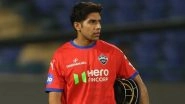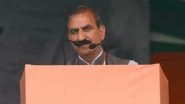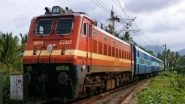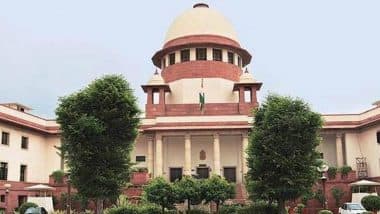New Delhi, December 10: The Supreme Court is scheduled to hear on December 13 a plea filed by Bilkis Bano, who was gangraped and seven members of her family killed during the 2002 Gujarat riots, challenging the remission of sentence of 11 convicts in the case by the state government.
A bench of justices Ajay Rastogi and Bela M Trivedi is likely to take up the plea of Bano, who has also filed a separate prayer seeking a review of the apex court's May 13, 2022 order on a plea by a convict. Bilkis Bano Moves Supreme Court Against Release of Gang-Rape Convicts; Says ‘Premature Release of Convicts Shook Her Daughters, Society’.
The top court had asked the Gujarat government to consider the plea for premature release of the convicts in terms of its policy of July 9, 1992 about deciding a remission petition within a period of two months. In her plea against the grant of remission which had led to the release of the convicts on August 15, Bano said the state government passed a mechanical order completely ignoring the requirement of law as laid down by the Supreme Court.
"The enmasse premature release of the convicts in the much talked about case of Bilkis Bano, has shaken the conscience of the society and resulted in a number of agitations across the country," she said in the plea.
Referring to past verdicts, the plea said enmasse remissions are not permissible and moreover, such a relief cannot be sought or granted as a matter of right without examining the case of each convict individually based on their peculiar facts and role played by them in the crime. Bilkis Bano Moves Supreme Court Challenging Release of 11 Convicts in Gangrape Case.
"The present writ petition challenging the decision of the state/central government granting remission to all the 11 convicts and releasing them prematurely in one of the most gruesome crimes of extreme inhuman violence and brutality by a group of human beings upon another group of human beings, all helpless and innocent people - most of them were either women or minors, by chasing them for days together persuaded by hate towards a particular community," it said.
The plea, which gave minute details of the crime, said Bano and her grown-up daughters were shell-shocked with this sudden development .
"The decision of the government came as a shock to the citizens, nationally and internationally, and the society across segments showed anger, disappointment, distrust and protested the clemency shown by the government.
"When the nation was celebrating its 76th Independence Day, all the convicts were released prematurely and were garlanded and felicitated in full public glare and sweets were circulated and this is how the present petitioner along with the entire nation and the whole world came to know about the shocking news of premature release of all the convicts (respondents no. 3-13) of one of the most gruesome crime this country has ever seen of multiple time gang rape of a pregnant woman," it said.
It referred to wide-virtual public protest in each city, on all social media platforms and news channels, portals. It was also reported heavily that Muslims of the area started fleeing away from Rahimabad in fear after release of these 11 convicts, the plea said. The separate review plea said Bano was not made a party to the petition by a convict who along with others was released under the state's remission policy which is not in force.
"In view of the development that the policy dated July 09, 1992 stood cancelled vide circular dated May 08, 2003 of State of Gujarat, it was necessary to be examined whether still the policy dated 09.07.1992 would be the relevant policy for remission application of the convicts to be considered, if at all the State of Gujarat is the appropriate Government under section 432 CrPC," the review plea said.
The top court is already seized of PILs filed by CPI(M) leader Subhashini Ali, independent journalist Revati Laul, former vice chancellor of Lucknow University Roop Rekha Verma, and TMC MP Mahua Moitra against the release of the convicts.
Bano was 21 years old and five months pregnant when she was gangraped while fleeing the riots that broke out after the Godhra train burning incident. Her three-year-old daughter was among the seven family members killed.
The investigation in the case was handed over to the CBI and the trial was transferred to a Maharashtra court by the Supreme Court.
A special CBI court in Mumbai had on January 21, 2008 sentenced the 11 to life imprisonment. Their conviction was later upheld by the Bombay High Court and the Supreme Court. The 11 men convicted in the case walked out of the Godhra sub-jail on August 15 after the Gujarat government allowed their release under its remission policy. They had completed more than 15 years in jail.













 Quickly
Quickly


